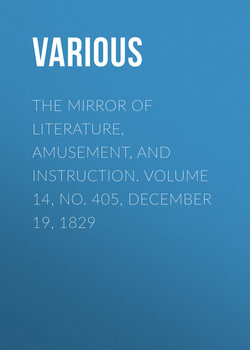Читать книгу The Mirror of Literature, Amusement, and Instruction. Volume 14, No. 405, December 19, 1829 - Various - Страница 3
NEW BUILDINGS, INNER TEMPLE
MINSTRELS
Оглавление(To the Editor of the Mirror.)
Sir,—Sometime ago a discussion arose in the public papers respecting the right of the King's Sergeant Trumpeter to grant licenses to minstrels for carrying on their calling in London and Westminster. I do not recollect whether this officer succeeded in establishing the right; but the following account of a similar privilege in another part of the country is founded on fact, and may furnish amusement to some of your readers:—
About the latter end of the reign of Richard I., Randal Blundeville, Earl of Chester, was closely besieged by the Welsh in his Castle, in Flintshire. In this extremity, the earl sent to his constable, Roger Lacy, (who for his fiery qualities received the appropriate cognomen of hell), to hasten, with what force he could collect, to his relief. It happened to be Midsummer-day, when a great fair was held at Chester, the humours of which, it should seem, the worthy constable, witless of his lord's peril, was then enjoying. He immediately got together, in the words of my authority, "a great, lawless mob of fiddlers, players, cobblers, and such like," and marched towards the earl. The Welsh, although a musical people, not relishing this sort of chorus, thought it prudent to beat a retreat, and fled. The earl, by this well-timed presto-movement, being released from danger, returned with his constable to Chester, and in reward of his service, granted by deed to Roger and his heirs, authority "over all the fiddlers, minstrels, and cobblers in Chester."
About the end of the reign of John, or the beginning of that of Henry III., the fire of Roger being extinguished by death, his son John Lacy, granted this privilege by deed to his steward, one Hugh Dutton and his heirs, in the words following:—"Dedi et concessi, et per hac presenti charta mea, confirmavi Hugoni de Dutton, et heredibus suis, magistratum omnium lecatorum, et meretricum, totius Cestershiriae," &c.
Dugdale relates in his Monasticon, p. 860, that "under this grant, and by ancient custom, the heirs of Dutton claim and exercise authority over all the common fiddlers and minstrels in Chester and Cheshire; and in memory of it, keep a yearly court at Chester on Mid-summer-day, being Chester Fair, and in a solemn manner ride attended through the city to St. John the Baptist's Church, with all the fiddlers of the county playing before the Lord of Dutton, and then at the court renew their licenses yearly; and that none ought to use the trade or employment of a minstrel, or fiddler, either within the city or county, but by an order and license of that court." I find too that this privilege has received the sanction of the legislature; for by the Act of 17 George II., cap. 5., commonly called the Vagrant Act, which includes "minstrels" under that amiable class of independents, the rights of the family of Dutton in the county of Chester are expressly reserved. Perhaps some of your numerous Correspondents may be able to say whether this very singular Court of Concert is still kept up.
ANTIQUARIUS.
